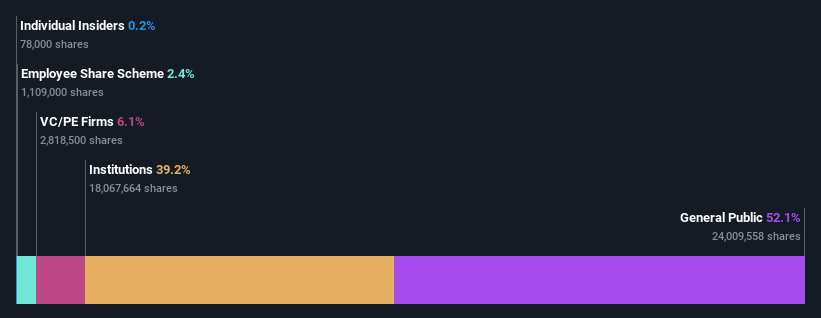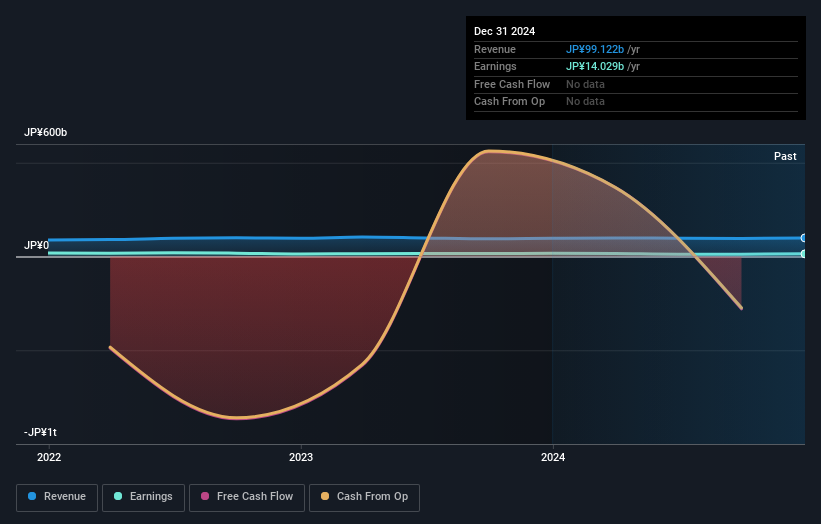The Shiga Bank, Ltd. (TSE:8366) surges 7.2%; individual investors who own 52% shares profited along with institutions

Key Insights
- Shiga Bank's significant individual investors ownership suggests that the key decisions are influenced by shareholders from the larger public
- A total of 25 investors have a majority stake in the company with 47% ownership
- 39% of Shiga Bank is held by Institutions
A look at the shareholders of The Shiga Bank, Ltd. (TSE:8366) can tell us which group is most powerful. And the group that holds the biggest piece of the pie are individual investors with 52% ownership. That is, the group stands to benefit the most if the stock rises (or lose the most if there is a downturn).
While individual investors were the group that reaped the most benefits after last week’s 7.2% price gain, institutions also received a 39% cut.
In the chart below, we zoom in on the different ownership groups of Shiga Bank.
See our latest analysis for Shiga Bank

What Does The Institutional Ownership Tell Us About Shiga Bank?
Institutional investors commonly compare their own returns to the returns of a commonly followed index. So they generally do consider buying larger companies that are included in the relevant benchmark index.
We can see that Shiga Bank does have institutional investors; and they hold a good portion of the company's stock. This implies the analysts working for those institutions have looked at the stock and they like it. But just like anyone else, they could be wrong. When multiple institutions own a stock, there's always a risk that they are in a 'crowded trade'. When such a trade goes wrong, multiple parties may compete to sell stock fast. This risk is higher in a company without a history of growth. You can see Shiga Bank's historic earnings and revenue below, but keep in mind there's always more to the story.

Hedge funds don't have many shares in Shiga Bank. Looking at our data, we can see that the largest shareholder is Wellington Management Group LLP with 7.2% of shares outstanding. For context, the second largest shareholder holds about 6.1% of the shares outstanding, followed by an ownership of 3.5% by the third-largest shareholder.
Our studies suggest that the top 25 shareholders collectively control less than half of the company's shares, meaning that the company's shares are widely disseminated and there is no dominant shareholder.
Researching institutional ownership is a good way to gauge and filter a stock's expected performance. The same can be achieved by studying analyst sentiments. We're not picking up on any analyst coverage of the stock at the moment, so the company is unlikely to be widely held.
Insider Ownership Of Shiga Bank
The definition of company insiders can be subjective and does vary between jurisdictions. Our data reflects individual insiders, capturing board members at the very least. The company management answer to the board and the latter should represent the interests of shareholders. Notably, sometimes top-level managers are on the board themselves.
Insider ownership is positive when it signals leadership are thinking like the true owners of the company. However, high insider ownership can also give immense power to a small group within the company. This can be negative in some circumstances.
Our data suggests that insiders own under 1% of The Shiga Bank, Ltd. in their own names. Keep in mind that it's a big company, and the insiders own JP¥463m worth of shares. The absolute value might be more important than the proportional share. It is good to see board members owning shares, but it might be worth checking if those insiders have been buying.
General Public Ownership
The general public -- including retail investors -- own 52% of Shiga Bank. This level of ownership gives investors from the wider public some power to sway key policy decisions such as board composition, executive compensation, and the dividend payout ratio.
Private Equity Ownership
Private equity firms hold a 6.1% stake in Shiga Bank. This suggests they can be influential in key policy decisions. Some investors might be encouraged by this, since private equity are sometimes able to encourage strategies that help the market see the value in the company. Alternatively, those holders might be exiting the investment after taking it public.
Next Steps:
It's always worth thinking about the different groups who own shares in a company. But to understand Shiga Bank better, we need to consider many other factors. For example, we've discovered 1 warning sign for Shiga Bank that you should be aware of before investing here.
Of course this may not be the best stock to buy. Therefore, you may wish to see our free collection of interesting prospects boasting favorable financials.
NB: Figures in this article are calculated using data from the last twelve months, which refer to the 12-month period ending on the last date of the month the financial statement is dated. This may not be consistent with full year annual report figures.
New: Manage All Your Stock Portfolios in One Place
We've created the ultimate portfolio companion for stock investors, and it's free.
• Connect an unlimited number of Portfolios and see your total in one currency
• Be alerted to new Warning Signs or Risks via email or mobile
• Track the Fair Value of your stocks
Have feedback on this article? Concerned about the content? Get in touch with us directly. Alternatively, email editorial-team (at) simplywallst.com.
This article by Simply Wall St is general in nature. We provide commentary based on historical data and analyst forecasts only using an unbiased methodology and our articles are not intended to be financial advice. It does not constitute a recommendation to buy or sell any stock, and does not take account of your objectives, or your financial situation. We aim to bring you long-term focused analysis driven by fundamental data. Note that our analysis may not factor in the latest price-sensitive company announcements or qualitative material. Simply Wall St has no position in any stocks mentioned.
About TSE:8366
Shiga Bank
Provides various banking products and services primarily in Japan.
Excellent balance sheet with proven track record and pays a dividend.
Market Insights
Community Narratives




